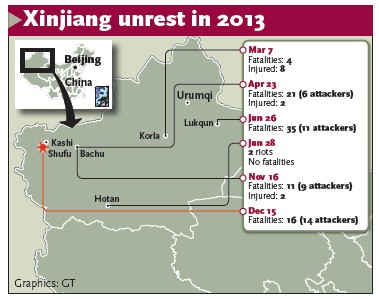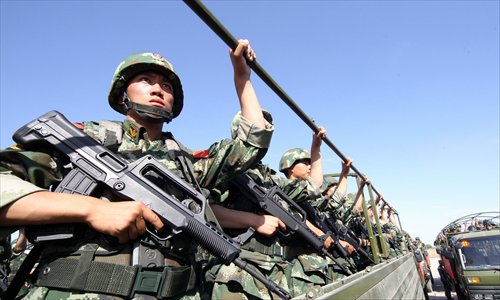Six held after Xinjiang attack


Armed police in Hami, Xinjiang Uyghur Autonomous Region attend an anti-terrorism drill in July this year. Photo: CFP
Local police in a township near Kashi, Northwest China's Xinjiang Uyghur Autonomous Region, have detained six suspects who were involved in a terrorist attack on Sunday, which killed 16 people, including two police officers and 14 attackers.
The incident, which was "organized and premeditated," took place in Sayibage township of Shufu county, administered by Kashi in western Xinjiang, according to local news portal ts.cn.
According to the report, Hesen Isma'il and another 19 people formed a violent terrorist gang in August. The gang frequently held gatherings and watched videos featuring violence and terrorism. They advocated extremist religious thoughts, produced explosive devices and guns, and tested explosives several times in a bid to plot terrorist attacks.
The report said police officers from the county, who were pursuing Isma'il, were attacked by several terrorists armed with knives and explosive devices at around 11 pm on Sunday, leading to the deaths of two officers. A total of 14 suspects were shot dead, and six have been arrested.
A Xinjiang official, who required anonymity, on Monday confirmed the report to the Global Times.
"The officers entered a house and found a large number of people were holding an illegal gathering. As the police carried out inquiries, some of the people remonstrated and staged a confrontation. They suddenly stabbed the police with knives. Two officers, who were caught off guard, died at the scene," said the official.
According to the official, the suspects immediately took out homemade explosive devices to attack other police officers who came as reinforcements. The police opened fire after the attackers ignored their warnings.
"These rioters were in a self-organized group, according to their weapons and terrorism propaganda materials found during the initial investigation," the official said, adding that the case is still under investigation.
Hua Chunying, spokesperson of the Ministry of Foreign Affairs, Monday told a regular press briefing that the Sunday attack was carried out by a "violent terrorist gang."
It once again shows these terrorists are "anti-society and against humanity," which should be condemned by the international community, she said.
"People in Xinjiang aspire to maintain social stability and unity. Violent terrorists' plots to devastate Xinjiang's economy, social stability and ethnic unity will not win public support and are doomed to failure," Hua said.
The Xinjiang official told the Global Times that the region has entered a period marked by frequent terrorist attacks.
The attack in Shufu was the latest to occur in the region in 2013.
A riot in Shanshan county, eastern Xinjiang, killed 35 people in late June, several days ahead of the fourth anniversary of deadly riots in the region's capital in 2009 which left 197 people dead and over 1,600 injured.
"The majority of the rioters were bewitched by overseas terrorism groups, such as the East Turkestan Islamic Movement (ETIM). Those groups carried out terrorist attacks in the name of 'holy war,'" the official said.
Li Wei, an anti-terrorism expert with the China Institutes of Contemporary International Relations, told the Global Times that the spread of the concept of a "holy war" is the most significant change in the motive for terrorist attacks.
"Such concepts show that the attacks have become more extreme and cruel. Those terrorist groups took advantage of local religious beliefs to brainwash people," Li said.
Li also pointed out that the attacks have spread to other areas in the region and even other Chinese cities, while previous attacks mainly occurred in southern Xinjiang.
On October 28, an SUV ploughed through bystanders near Tiananmen Square in Beijing, killing five and injuring 40 others. The attack was later claimed by ETIM.